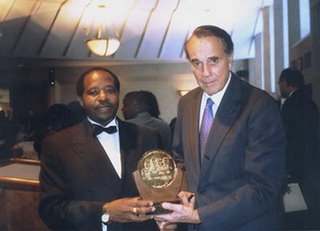Paul Rusesabagina 2000 Recipient of the Immortal Chaplains Prize for Humanity
Human Rights Watch report of the Rwanda Massacre
An Exceptional Case: The Hotel Mille Collines
In the first month of the genocide, international authorities once spoke clearly to avert slaughter. They were heeded immediately.
Beginning on April 7, hundreds of people-most of them Tutsi or Hutu threatened by Hutu Power supporters-took shelter at the Mille Collines, a luxury hotel in central Kigali owned by Sabena airlines. Although set apart from city streets by its spacious, well-groomed grounds, this expensive hotel offered no defense against attack beyond its international connections. On April 15, Paul Rusesabagina, temporarily manager of the hotel, called for its protection in an interview with a Belgian newspaper, as did an official of Sabena, who spoke on Belgian television. Rwandan authorities responded by posting some National Police at the hotel. In later contacts with the press and others, by telephone calls and fax messages, occupants of the hotel made the Mille Collines a symbol of the fear and anguish suffered by the Tutsi and others during these weeks.
On April 23, a young lieutenant of the Department of Military Intelligence, reportedly a nephew of Bagosora named Iyakamuremye, arrived at the hotel at around 6 a.m. and ordered Rusesabagina to turn out everyone who had sought shelter there. Told that he had half an hour to comply with the order, Rusesabagina went up to the roof and saw that the building was surrounded by military and militia. He and several of the occupants began telephoning influential persons abroad, appealing urgently for help. Their calls were presumably relayed byrepresentatives of Sabena, who would have been eager both to save lives and to protect their costly investment. According to Rusesabagina, one of the foreign authorities called from the hotel was the Director General of the French Foreign Ministry. Before the half hour had elapsed, a colonel from the National Police arrived to end the siege and to oblige the lieutenant to leave.
In a similar incident on May 13, a captain came to the hotel in the morning to warn that there would be an attack at 4 in the afternoon. On that day, the French Foreign Ministry "received a fax from the hotel saying that Rwandan government forces plan to massacre all the occupants of the hotel in the next few hours." It directed its representative at the U.N. to inform the secretariat of the threat and presumably also brought pressure to bear directly on authorities in Kigali, as others may have done also. The attack never took place.
None of the people who took shelter at the hotel was killed during the genocide and none was killed at a small number of other sites under foreign protection, like the hospital in Kigali run by Doctors Without Borders and the International Committee of the Red Cross. Perhaps these sanctuaries could not have been replicated so successfully elsewhere. But certainly it would have been right to try.




0 Comments:
Post a Comment
<< Home